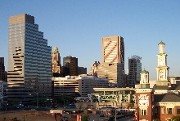Detailed Highlights of O'Malley-Ehrlich Debate

Two debates were held in the Maryland Gubernatorial race this weekend. If you didn't hear about them, you're not alone. The last-minute events were put together such that both debates actually occurred on the same day, on a weekend, and the press gave minimal notice to the public. In an election year where Marylanders are already angry that the primary election suffered from glitches that disenfranchised voters, the dismissive way in which the debates were handled is considered by some to be nothing short of a debacle.
Only one of the debates between Maryland Governor Bob Ehrlich (R-MD) and Mayor Martin O'Malley (D-MD) was televised, and the challenger dominated.
In case you missed it, here are the highlights.
Opening Statements
The contrast in style and governing philosophies was apparent from the outset. Governor Ehrlich used his opening statement to chat it up the host, admitting that this election is a referendum on his incumbency, and rattling off some data. O'Malley, by contrast, looked directly into the camera and struck a Clintonian note as he outlined broad themes, appealing to Marylanders to set aside their differences and reach compromises on vital issues. As the challenger, this was O'Malley's opportunity to define himself as a serious contender, and he seems to have done that.
Education
The first topic up for discussion was education, and Ehrlich moved in for the attack. Due to some of the problems in Baltimore schools, O'Malley is seen as vulnerable on that issue, and Ehrlich ticked off the examples of failing Baltimore schools. O'Malley was clearly prepared for this, and countered that three of the top schools in the state are in Baltimore City. O'Malley also hit hard on the lack of affordable college education in Maryland, something Maryland was once renowned for, but which has changed during the Ehrlich years. And the two seemed poised to have a genuine debate about charter schools and the influence of private corporations on public education. Unfortunately, this part of the debate rambled off into territory that most voters would have been unlikely to follow. Ehrlich made a provocative, but unexplained claim, that Baltimore students were being deprived of their constitutional rights. The candidates bickered about the funding of the Thornton law, the specifics of which many Marylanders wouldn't understand. Neither candidate explained it very well. O'Malley claims that Ehrlich is underfunding education--the Maryland Budget and Tax Policy Institute certainly indicates that lack of state spending may be to blame for Baltimore's educational problems. Ehrlich disagreed, but neither man seemed to be able to score any real points or enlighten voters during this exchange.
Coming into the debate, many worried, or hoped, that O'Malley would lose his famous Irish temper while defending his record as Mayor of Baltimore. Contrary to expectations, for the rest of the debate, it would be Ehrlich on the ropes, defending his record with an increasingly testy tone.
Energy
Baltimore Gas & Electric this year attempted to raise their rates more than 70%. To say that Maryland consumers freaked out would be an understatement. O'Malley ended up suing to forestall the rate hike and an agreement was eventually reached with the state legislature. The BG&E fiasco is still a stress point in the state as consumers scramble to figure out how they are going to afford the rate increase, and the candidates argued about this issue passionately. O'Malley used it to underline his theme that Ehrlich always sides with the powerful over the people--that Ehrlich is on the side of the energy companies gouging the consumers. Ehrlich, blamed the whole thing on the long-since-out-of-office state legislature that originally enacted the deregulation plan. The two slugged it out over the regulation commission and whether or not it should have done more. And it ended in a blistering exchange between the two where Ehrlich told O'Malley that it was wrong to demonize his friends, and O'Malley shot back that it was worse to sell out the working people of the state out of loyalty to those friends.
It was a hard hit on Ehrlich that he was unable to counter.
Crime
Ehrlich and O'Malley duked it out over state and city crime levels, each with a mountain of statistics to back up the claims. But it was actually talking about crime--thought to be the mayor's weak spot--that O'Malley became most passionate. He launched into a passionate law-and-order tirade about Ehrlich's inability to keep violent offenders from being paroled, and encouraged Marylanders to view crime as a problem that could not be solved without community cooperation. He talked about the need to be unafraid of setting high goals and striving to achieve them. After which, Ehrlich sniffed, "I don't know what that means."
Federalism
There was less talk about George Bush in this debate than one might have expected. Most of the controversy surrounded a perceived difference between the two candidates on their ideas about state government and its role. At one point, Ehrlich seemed to defend Bush--giving O'Malley an excuse to accuse Ehrlich of supporting a party that "wants to make the Federal Government as weak as possible, as quickly as possible."
Ehrlich tried to position himself as a blunt, every-day guy. In spite of the ongoing controversy around the Governor's ban on state employees speaking to reporters who have been critical of his administration, he told the voters that he was "upfront and honest," and would "tell it like it is."
This was one of the high points for Ehrlich in the debate, but it lasted only about twenty seconds before O'Malley twisted it into a devastating critique of Ehrlich's perceived failure to stand up to George Bush on Maryland's behalf.
"Ok, let's tell it like it is," O'Malley replied. He said Ehrlich had failed to fight for Marylanders against the Dubai Port Deal which would have allowed the Port of Baltimore to be managed by the United Arab Emirates, and that Ehrlich failed to protect Marylanders against the federal government's lowered pollution standards for mercury in the Chesapeake Bay. The critique was particularly damning because the Dubai Port Deal and the Environment are two issues that cross party lines in Maryland.
Ehrlich was again unable to counter the statement.
Transportation
Ehrlich was again put on the defensive about transportation, but he fared well in the debate on the issue anyway. Though recent studies have shown that the local commute is now one of the worst in the nation, Ehrlich claimed that he had aggressively improved the sad transportation infrastructure of the state. O'Malley mostly talked about his openness to solutions to the transportation problem from thinkers in either party, and about his belief in the need for investment in infrastructure, without giving many specifics.
Taxes
Much bickering was to be had about who had raised taxes more. This led, improbably, to Ehrlich expressing his frustration at O'Malley's attacks and saying of the state funding of Baltimore City, "Without us, you're done!"
This seemed to light a slow fire under O'Malley, whose voice burned with indignation as he reminded Ehrlich that residents of Baltimore are Marylanders, and used the comment to demonstrate what he called the "politics of division," where the state and the city could be turned against one another for political gain.
Ehrlich challenged O'Malley to promise voters he would never raise taxes. O'Malley declined artfully, explaining that it would be irresponsible to make such a promise in light of the exigent circumstances that could require it, such as the 9/11 attack had required increased revenue to secure our state. O'Malley also seemed to indicate that talk was cheap, reminding voters that Ehrlich had promised never to raise taxes--but had in fact done so. He continually accused the Governor of having one face for elections, and another for the actual governing, but it didn't seem to be an especially effective point when it came to taxes, where the 'read-my-lips' generation has heard it all.
Environment
By contrast, O'Malley was able to effectively use his "the two Bob Ehrlichs" theme when it came to the environment. After a testy exchange about the flush tax and whether or not it was helping the environment, Ehrlich wanted to know if O'Malley was now opposing environmental legislation. O'Malley shot back, "Oh no. I liked the Bob Ehrlich who said he wanted to clean up the Bay," and then accused the Governor of betraying the environment when it wasn't an election year.
O'Malley advocated the passage of Question 1 on Maryland's ballot this election, which would prohibit a Governor from selling off any state-owned outdoor recreation, open space, conservation, preservation, forest, or park land without the express approval of the General Assembly. This is, of course, in response to Ehrlich's land-sale scandals earlier in his administration.
The debate on the environment touched on Ehrlich's land-sale scandals and Project Open Space, but neither issue was dealt with in sufficient depth to score any real points. The fact that O'Malley pointed out all of his endorsements from environmental groups, however, may sway conservation-conscious voters who are wondering about his credentials.
Closing
Only during the closing remarks did Mayor O'Malley finally give in to the temptation to tick off a laundry list of programs and plans, deftly holding up a bright green pamphlet with his campaign logo on it for the camera. It was Ehrlich who chose to close on some overarching ideas, like the fact that he had been elected to Annapolis to change the status quo. But now that he's the incumbent, he represents the status quo, so that argument no longer carries any weight.
(END NOTE: This race is going to tighten. O'Malley is a weapon Democrats need in our toolbox. He is a rising star in the party, charismatic, and an investment in him is not only an investment in this race, but in the future. Please consider donating to the campaign.)






1 Comments:
Both debates were televised. The first debate was taped and aired Monday evening, the second was live and aired on Saturday.
Post a Comment
<< Home